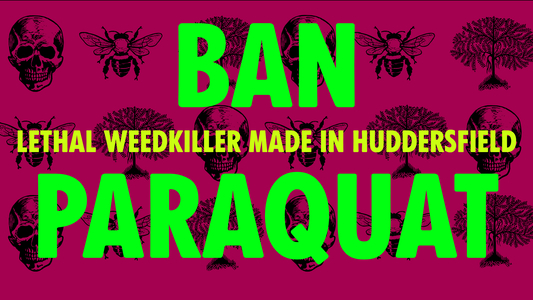100 signatures reached
To: J ERIK FYRWALD, CEO Syngenta
BAN PARAQUAT - LETHAL WEEDKILLER MADE IN HUDDERSFIELD

Stop Syngenta producing paraquat
Why is this important?
BAN PARAQUAT – LETHAL WEEDKILLER MADE IN HUDDERSFIELD.
According to the Pesticide Action Network "Paraquat is the most highly acutely toxic herbicide to be marketed over the last 60 years". It is so toxic that one sip can be lethal. It’s been banned in over 50 countries, including the UK and EU since 2007. Yet it is still produced for export at the vast Syngenta plant near the centre of Huddersfield, West Yorkshire. Huddersfield MP Barry Sheerman wants to see a worldwide ban on paraquat, and is calling for Syngenta to stop making paraquat in the town.
Tens of thousands of tonnes of paraquat leave the plant every year, over a third goes to America where strict licensing laws govern its storage and use, though deaths still occur. Australia and Japan are also wealthy customers. The rest goes to various developing countries where thousands of deaths – both suicidal and accidental - have been reported. Syngenta itself estimated the worldwide toll to be 2,000 deaths per year, 95% of which are suicides.
In 2014 there was a leak of paraquat at the Huddersfield plant, but the serious threat to the community this represented was averted by the direction of the wind. Inhaling the substance can lead to lung damage and evidence points to Parkinson’s disease too. Syngenta was fined £200,000 and carried on production.
Every April Syngenta’s loudest siren is tested on the streets near the plant. Following a real incident this siren indicates residents should go indoors immediately, extinguish all naked flames, shut all sources of ventilation, leave children at school... until the all clear is announced on Radio Leeds.
This campaign seeks to address the direct serious human risks posed by continued production and use of paraquat. As well as suicides, accidental swallowing, Parkinson's and lung disease there is also CATASTROPHIC ENVIRONMENTAL HARM. As it takes up to 6 years to degrade in the soil it can have a serious impact on humans and other mammals. There is an urgent demand from farmers worldwide to reduce the effects of paraquat on agriculture.
Jon Heylings, formerly a leading toxologist at Syngenta for over 20 years, warned his employers repeatedly that the levels of PP796 (vomit-inducing additive) were insufficient in paraquat-based weedkillers to trigger prompt vomiting, leading to multiple organ failure and slow death.
To read or watch more about paraquat and its dangers, please select the link, copy and then paste in into your web browser or select, right click and select Go To:
t.ly/08md (link to Huddersfield Examiner article - MP Barry Sheerman)
t.ly/21yM (link to Greenpeace Unearthed)
t.ly/jAxX (A sip can kill - Guardian article)
t.ly/X7yE (Scientist tells of relief.. - Guardian article)
t.ly/jEul (CH4 News - Revealed: Why UK kept exporting a deadly pesticide that kills thousands)
According to the Pesticide Action Network "Paraquat is the most highly acutely toxic herbicide to be marketed over the last 60 years". It is so toxic that one sip can be lethal. It’s been banned in over 50 countries, including the UK and EU since 2007. Yet it is still produced for export at the vast Syngenta plant near the centre of Huddersfield, West Yorkshire. Huddersfield MP Barry Sheerman wants to see a worldwide ban on paraquat, and is calling for Syngenta to stop making paraquat in the town.
Tens of thousands of tonnes of paraquat leave the plant every year, over a third goes to America where strict licensing laws govern its storage and use, though deaths still occur. Australia and Japan are also wealthy customers. The rest goes to various developing countries where thousands of deaths – both suicidal and accidental - have been reported. Syngenta itself estimated the worldwide toll to be 2,000 deaths per year, 95% of which are suicides.
In 2014 there was a leak of paraquat at the Huddersfield plant, but the serious threat to the community this represented was averted by the direction of the wind. Inhaling the substance can lead to lung damage and evidence points to Parkinson’s disease too. Syngenta was fined £200,000 and carried on production.
Every April Syngenta’s loudest siren is tested on the streets near the plant. Following a real incident this siren indicates residents should go indoors immediately, extinguish all naked flames, shut all sources of ventilation, leave children at school... until the all clear is announced on Radio Leeds.
This campaign seeks to address the direct serious human risks posed by continued production and use of paraquat. As well as suicides, accidental swallowing, Parkinson's and lung disease there is also CATASTROPHIC ENVIRONMENTAL HARM. As it takes up to 6 years to degrade in the soil it can have a serious impact on humans and other mammals. There is an urgent demand from farmers worldwide to reduce the effects of paraquat on agriculture.
Jon Heylings, formerly a leading toxologist at Syngenta for over 20 years, warned his employers repeatedly that the levels of PP796 (vomit-inducing additive) were insufficient in paraquat-based weedkillers to trigger prompt vomiting, leading to multiple organ failure and slow death.
To read or watch more about paraquat and its dangers, please select the link, copy and then paste in into your web browser or select, right click and select Go To:
t.ly/08md (link to Huddersfield Examiner article - MP Barry Sheerman)
t.ly/21yM (link to Greenpeace Unearthed)
t.ly/jAxX (A sip can kill - Guardian article)
t.ly/X7yE (Scientist tells of relief.. - Guardian article)
t.ly/jEul (CH4 News - Revealed: Why UK kept exporting a deadly pesticide that kills thousands)
How it will be delivered
Email the petition to Syngenta
